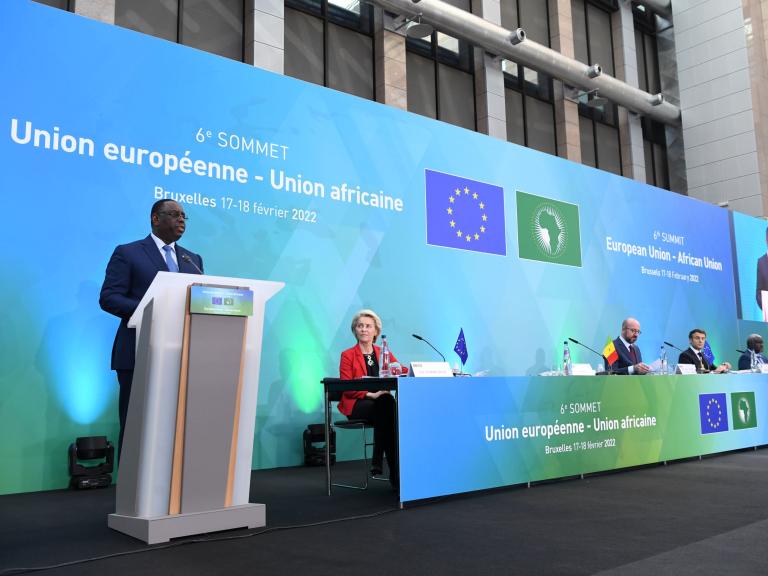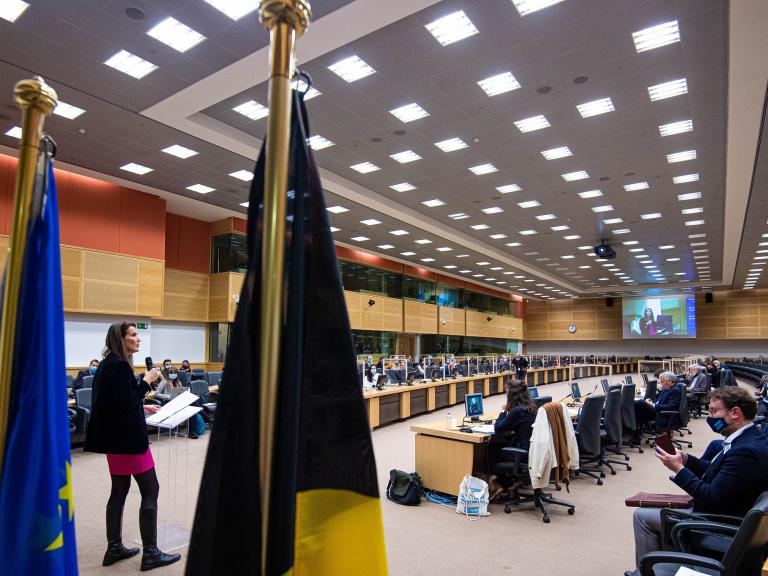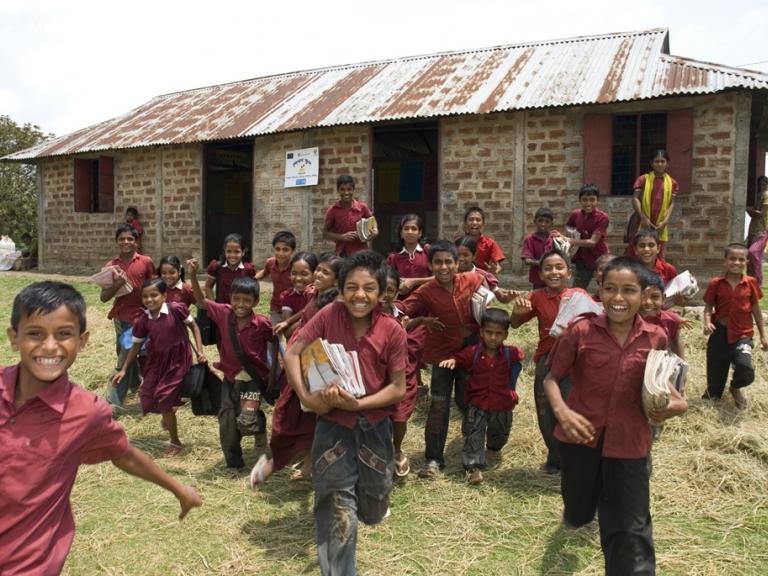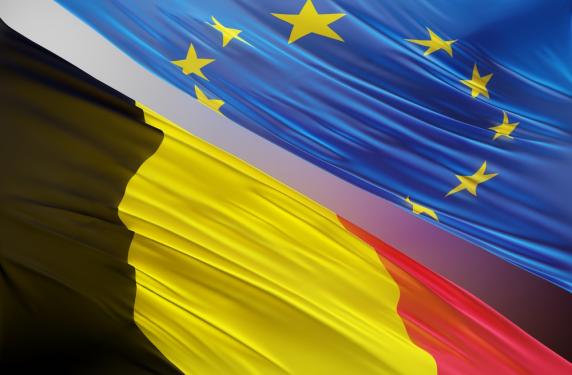Its role gained in importance as the European integration was progressing. The European policy of Belgium is defined through more than 545 coordination meetings a year the DGE organizes with the federal departments, the communities and the regions. Its objective? Find a consensus and make Belgium speak with one voice on the European scene. Besides, the DGE maintains numerous contacts with foreign interlocutors on the European level. The DGE is responding to the questions the citizens raise about Europe by providing certain services, by organizing specialized training sessions and by taking targeted communication actions.
-
Belgian Presidency of the Council of the European Union
From 1 January to 30 June 2024, Belgium will hold the Presidency of the Council of the European Union (the "Council").
-
Coordination of the European policy and the representation of Belgium
In accordance with the constitutional principle of in foro interno, in foro externo (i.e. the parallelism between internal and external competences), the federated entities of Belgium are empowered to act on the international aspects of their internal powers (such as energy, environment, education, etc.). With the signing of the 1992 Treaty of Maastricht, it also became possible for the ministers of the federated entities to represent their Member State in the Council of the European Union.
-
Organisation chart
Organisation chart of the Directorate-general European Affairs and Coordination (DGE).
-
Who are we?
Mission and structure of the Directorate-general European Affairs and Coordination.
-
Annual report on the activities of the EU
On this page you'll find the annual report on the activities of the EU.
-
Freedom, security and justice
The Union is founded on the Treaty on European Union and the Treaty on the Functioning of the European Union. The Union offers its citizens an area of freedom, security and justice without internal borders, in which the free movement of persons is ensured in conjunction with appropriate measures with respect to external border controls, asylum, immigration and the prevention and combating of crime, and in which fundamental rights and the different legal systems and traditions of the Member States are respected.
-
Economic & monetary union, European budget and social convergence
Economic governance means coordinating the economic policies of Member States of the European Union (EU), designed to achieve the EU’s objectives. The financial, budgetary, and economic crisis which began in 2008 demonstrated that the EU needed a more effective model of governance than the model of coordination or ad hoc responses that had been appropriate until then. The need for the structural reform of the Economic and Monetary Union (EMU) was highlighted by underlining the role of budgetary control and the social component. The deepening of the EMU is intended to be the driving force of a harmonious socio-economic governance. Given the risk posed by the persistence of serious imbalances in this area, social and employment indicators will now be considered in economic analyses.
-
Internal market and industry
The internal market is based on the four main freedoms (goods / people / services / capital). All the necessary measures are taken to facilitate day-to-day life and create more opportunities for the consumers, businesses and public authorities that invest, purchase and sell goods and services within the internal European market. With the new European legislature, the search for sustainable growth via the transition to a carbon-neutral economy requires a broader and more integrated vision of the internal market, which is more in line with industrial and trade policies.
-
Climate and energy
The climate and energy policy of the European Union is based on three crucial pillars: energy security, competitiveness and sustainability. The new framework for action up to 2030 introduces the intermediate target of reducing greenhouse gas emissions by at least 55%, compared to 1990 levels. This represents an intermediate step towards the goal of achieving climate neutrality by 2050, which is the purpose of the Green Deal.
-
The EU digital agenda
The European Commission launched its Digital Agenda for Europe in February 2020, with a series of thematic and legislative initiatives in the digital field. This digital strategy forms - together with the Green Deal - the twin challenge of transforming the European economy into a sustainable economy and society for the future.
-
Transport
Transport is a cornerstone of European integration and is vital for fulfilling the free movement of individuals, services and goods. EU transport policy helps keep the European economy moving by developing a modern infrastructure network that makes journeys quicker and safer, while promoting sustainable and digital solutions.
-
Environment and health
Environmental problems, such as air pollution, do not stop at national borders. Partly driven by global developments, the EU has built up an impressive body of legislation, whereby the Member States are collectively seeking solutions for tackling cross-border environmental problems such as air pollution, water pollution and loss of biodiversity. The EU Member States largely organise their own healthcare for their citizens. The EU supplements national policy by establishing common objectives. For example, the EU provides help in tackling common challenges such as epidemics, chronic illnesses or an ageing population. The EU's role in the field of health is set to grow in the future.
-
Agriculture and fisheries
The main components of the Common Agricultural Policy (CAP) are direct payments to support farmers' incomes, the common organisation of the markets for agricultural products and the development of the EU's rural areas. The Common Fisheries Policy (CFP) aims to preserve marine biological resources: fish, crustaceans and shellfish, and to manage the European Union's fishing fleet. The CFP also aims to ensure the long-term environmental sustainability of marine fisheries and aquaculture activities and the positive economic and social benefits for fishermen and coastal communities.
-
Trade policy
The trade policy of the European Union, commonly known as the Common Commercial Policy, is an exclusive competence of the Union. The European Commission negotiates with trading partners on behalf of the Union, after obtaining a mandate from the Member States. The Member States offer the Commission assistance and guidance during these negotiations, while the Commission keeps the European Parliament immediately and fully informed. In accordance with the Treaty on Functioning of the European Union, the Commission conducts such trade negotiations both with third countries and within the framework of international organisations, primarily the World Trade Organisation (WTO). The EU institutions are also responsible for creating and implementing EU laws on trade.
-
External relations
As a result of the Lisbon Treaty, which entered into force on 1 December 2009, and as a result of the appointment of a High Representative for Common Foreign and Security Policy (who is also Vice-President of the European Commission) and of the creation of a European External Action Service (EEAS), the European Union's external relations were fundamentally redesigned, thereby enabling the European Union to become more responsive. The actions undertaken by the EU are guided by the principles that the organisation seeks to promote throughout the world: peace, democracy, the rule of law, human rights and fundamental freedoms.
-
Treaties, institutions and European political project
The European Union is founded on the values of democracy, the rule of law and respect for fundamental rights and continues to implement the objectives for the benefit of its citizens. In pursuit of these objectives, the Union relies on legal bases, the European treaties and institutions: the European Council, the European Parliament, the European Commission, the Council of the European Union and the Court of Justice.
-
Transposition
Following approval, a directive must be transposed into national legislation by each EU Member State within the period of time provided for. Where a directive is not transposed in a correct or timely manner or where EU law is improperly or incompletely applied, the European Commission may begin infringement proceedings against the defaulting Member State, which may lead to a conviction by the Court of Justice of the European Union.
-
SOLVIT, mediation for administrative problems in Europe
SOLVIT is a free online mediation network set up by the European Commission in 2002 to help citizens and businesses living, working or studying in a Member State other than their own to solve administrative problems related to their rights as EU citizens. The Belgian SOLVIT Centre is affiliated to the FPS Foreign Affairs, Foreign Trade and Development Cooperation.
-
Scholarships
Information on the Traineeships Bernheim Foundation and the College of Europe.
-
Europe Direct, Europe in your neighbourhood
The Europe Direct information centres are an initiative of the European Commission. Set up in 1997 in cooperation with the FPS Foreign Affairs, most of these centres operate in the provinces and receive support from the provincial authorities.
-
Transposition of European directives
This page provides more information on the transposition of European directives.
-
Conference on the Future of Europe
The Conference on the Future of Europe is a citizen-driven series of debates and discussions, in which people from all over Europe can share their ideas and help build our common future. This conference is unique of its kind: large-scale, Pan-European and democratic. It will provide a new forum for open, inclusive and transparent consultations with citizens on a number of key priorities and challenges.
-
The objective for Belgium
Belgium aims to reinforce trust in politics as a positive force by making democratic renewal a priority. Democratic functioning must be modernised by striving for simplification and by opening up to new forms of participation. That way, we will enrich our representative democracy with more direct citizen participation in the political decision-making process.
-
Belgian citizens' panels
As one of the 27 Member States of the European Union, Belgium decided to participate in the Conference on the Future of Europe by organising citizens’ panels, including on a national level.
-
Overview of all Belgian events and initiatives on a federal level and at the level of federated entities
Overview of all Belgian events and initiatives on a federal level and at the level of federated entities.
-
Links
Useful links concerning the Conference on the Future of Europe.

EU-AU summit: two unions, one vision
In Brussels, the European and African Union developed a hopeful plan for the future that should bring prosperity and stability t...

EU: more democracy in practice
Geography teacher Rafik Kiouah talks about his participation in a Belgian citizens' panel on a more democratic EU as part of the...

The EU joins forces for external action
The European Union is combining various funding channels into a single instrument: Global Europe. The simplification will give t...
